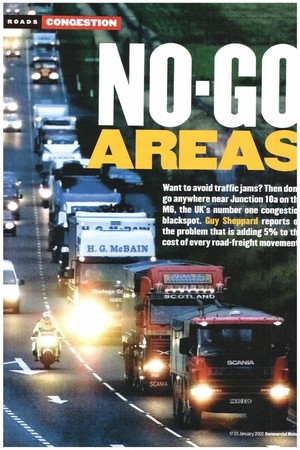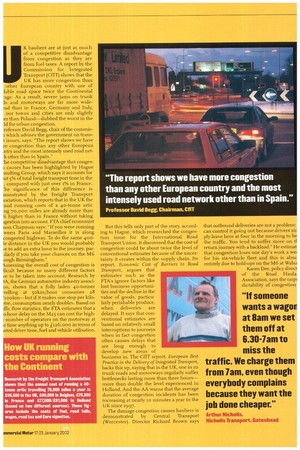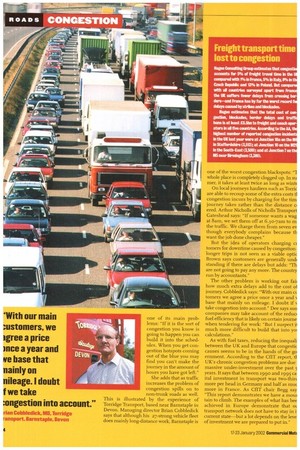Want to avoid traffic jams? Then do go anywhere near
Page 42

Page 43

Page 44

If you've noticed an error in this article please click here to report it so we can fix it.
Junction 10a on t MG, the UK's number one congesti blackspot. Guy Sheppard reports the problem that is adding 5% to t cost of every road-freight movemen 5 K hauliers are at just as much of a competitive disadvantage from congestion as they are from fuel taxes. A report by the Commission for Integrated Transport (CfIT) shows that the UK has more congestion than other European country with use of table road space twice the Continental -age. As a result, severe jams on trunk Is and motorways are far more widead than in France, Germany and Italy, our towns and cities are only slightly :er than Poland—dubbed the worst in the Id for urban congestion.
rofessor David Begg, chair of the commis" which advises the government on trans tissues, says: The report shows we have re congestion than any other European dry and the most intensely used road net:k other than in Spain."
'he competitive disadvantage that conges1 causes has been highlighted by Hague 'suiting Group, which says it accounts for ,ut 5% of total freight transport time in the ., compared with just over s% in France.
lie significance of this difference is nonstrated by the Freight Transport
;ociation, which reports that in the UK the
ival running costs of a 40-tonne artic ng 70,000 miles are already more than I/O higher than in France without taking sgestion into account. ETA chief economist non Chapman says: "If you were running
ween Paris and Marseilles it is along
congested highway. To do the same 400le distance in the UK you would probably
ie to add an extra hour to the journey, parilarly if you take your chances on the M6 ough Birmingham."
ksses sing the overall cost of congestion is ficult because so many different factors ve to be taken into account. Research by >A, the German automotive industry associon, shows that a fully laden 4o-tonner veiling at 50lcm/hour consumes 28
'sookm—but if it makes one stop per kiloAre, consumption nearly doubles. Based on
file flow statistics, the FTA estimates that a a-hour delay on the M25 can cost the high. numberof operators on the motorway at e time anything up to 1126,000 in terms of stecl driver time, fuel and vehicle utilisation. But this tells only part of the story, according to Hague, which researched the congestion issue for the International Road Transport Union. It discovered that the cost of congestion could be about twice the level of conventional estimates because of the uncertainty it creates within the supply chain. Its report, Economic Cost of Barriers to Road Transport, argues that estimates such as the FTA's ignore factors like lost business opportunities and the decline in the value of goods, particularly perishable produce, when deliveries are delayed. It says that conventional estimates are based on relatively small interruptions to journeys when in fact congestion often causes delays that are long enough to develop new areas of business in. The CfiT report, European Best Practice in the Delivery of Integrated Transport, backs this up, saying that in the UK, one in so trunk roads and motorways regularly suffer bottlenecks lasting more than three hours— more than double the level experienced in Holland. And the AA warns that the average duration of congestion incidents has been increasing at nearly so minutes a year in the UK since 1997.
The damage congestion causes hauliers is demonstrated by Central Transport (Worcester). Director Richard Brown says that outbound deliveries are not a problem: can control it going out because drivers sir ply leave here at four in the morning to be the traffic. You tend to suffer more on ti return journey with a bacldoad." He estimat that congestion loses one day's work a we' for his six-vehicle fleet and this is almc entirely due to hold-ups on the M6 at Walsa Karen Dee, policy direct of the Road Haula Association, says the unpi dictability of congestion one of its main problems: "If it is the sort of congestion you know is going to happen you can build it into the schedules. When you get congestion hotspots coming out of the blue you may find you can't make the journey in the amount of hours you have got left."
She adds that as traffic increases the problem of congestion spills on to non-trunk roads as well. This is illustrated by the experience of Torridge Transport, based near Barnstaple in Devon. Managing director Brian Cobbledick says that although his 27-strong vehicle fleet does mainly long-distance work, Barnstaple is one of the worst congestion blackspots: "1 whole place is completely dogged up. In su mer, it takes at least twice as long as wint( On local journeys hauliers such as Tonic are able to recoup some of the extra costs ti congestion incurs by charging for the tim journey takes rather than the distance ci ered. Arthur Nicholls of Nicholls Transport Gateshead says: "If someone wants a wag at Sam, we set them off at 6.3o-7am to m the traffic. We charge them from seven ev though everybody complains because Hi want the job done cheaper."
But the idea of operators charging ci tomers for downtime caused by congestion longer trips is not seen as a viable optic Brown says customers are generally und standing if there are delays but adds: "Tli are not going to pay any more. The country run by accountants."
The other problem is working out fai how much extra delays add to the cost o journey. Cobbledick says: "With our main a torners we agree a price once a year and base that mainly on mileage. I doubt if take congestion into account." Dee says son companies may take account of the reduc fuel efficiency that is likely on certain jourric when tendering for work: "But I suspect it much more difficult to build that into yo calculations."
As with fuel taxes, reducing the inequali between the UK and Europe that conges tic causes seems to be in the hands of the go ernment. According to the CfIT report, ti UK's chronic congestion problems are due massive under-investment over the past 5 years. It says that between 1990 and 1995 a ital investment in transport was two-thirc more per head in Germany and half as muc more in France. As CfliT chair Begg say "This report demonstrates we have a rnou tam n to climb. The examples of what has bee achieved in Europe demonstrate that ot transport network does not have to stay in i current state—but a lot depends on the leve of investment we are prepared to put in."








































































































































